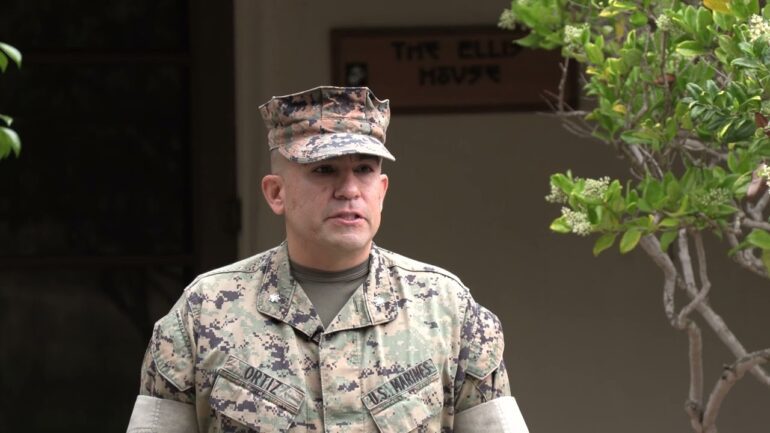TL;DR:
- Lt. Col. Pedro Ortiz, a Marine Corps Ph.D. graduate, focuses on the challenge of uncertainty in machine learning.
- His dissertation explores uncertainty quantification (UQ) methods in the context of massive satellite remote sensing data sets.
- UQ methods enhance decision-making by providing insights into the reliability of model-generated data.
- Ortiz joins a prestigious group of Marine Corps Ph.D. Program graduates, bringing strategic thinking to senior leader decision-making.
- His research has the potential to impact joint all-domain command and control (JADC2) operations.
- Ortiz will apply his expertise at the Department of Defense Chief Digital and Artificial Intelligence Office (CDAO).
Main AI News:
In the era of battlespace sensors and a deluge of data, military commanders face a perplexing dilemma: an abundance of information, yet a dearth of actionable insights.
Addressing this conundrum head-on, Lt. Col. Pedro Ortiz of the U.S. Marine Corps has delved into the realm of uncertainty in machine learning. Graduating from the Naval Postgraduate School (NPS) with a Ph.D. in Computer Science on June 16, Ortiz has devoted his dissertation to tackling this challenge, aiming to facilitate rapid and effective decision-making for commanders amidst the ever-expanding realms of sensor data and uncertainty.
Driven by a deep interest in applying artificial intelligence (AI) and machine learning to solve warfighter problems, Ortiz envisions a future where he can identify and explore warfighting predicaments, propose innovative solutions, and lead the implementation efforts within operational units.
Ortiz’s dissertation, titled “Uncertainty Quantification and Decomposition through Bayesian Deep Learning for Big Data Satellite Remote Sensing Problems,” epitomizes his pursuit. Through the application of probabilistic models to vast satellite remote sensing datasets, Ortiz has meticulously examined uncertainty quantification (UQ) methods that play a pivotal role in mitigating the impact of uncertainty during optimization and decision-making processes.
By joining the exclusive ranks of the Marine Corps Ph.D. Program (PHDP) graduate Ortiz solidifies his position among strategic and highly skilled thinkers entrusted with supporting senior leaders in decision-making, contributing to the development of defense and service strategies, and providing insights into long-range conceptual and capability development areas.
In his forthcoming assignment, Ortiz will report to the Department of Defense Chief Digital and Artificial Intelligence Office (CDAO), armed with his newfound knowledge and expertise. According to Ortiz, his research holds the potential to profoundly impact the joint all-domain command and control (JADC2) in both present and future operations.
Elaborating on his research, Ortiz elucidated, “We utilized datasets from two distinct satellites, each equipped with two different sensors. Leveraging probabilistic deep learning, we bridged the gaps in a microwave dataset using infrared data from another satellite. Furthermore, we successfully quantified the uncertainty, offering a measure of reliability for the generated data.”
The application of UQ methods has yielded fruitful results in addressing real-world problems across diverse scientific and engineering disciplines. Ortiz emphasizes that augmenting data and comprehending the underlying uncertainty equips warfighters with enhanced decision-making capabilities. High uncertainty often signifies questionable model outputs, whereas understanding uncertainty lends interpretability to model results, a vital aspect when dealing with target identification and other intricate automated military systems.
Ultimately, Ortiz contends that modeling predictions, bolstered by an understanding of uncertainty, will significantly contribute to decision-making processes, instilling a crucial element of trustworthiness in AI and machine learning.
Optimistic about the future impact of his research, Ortiz states, “I hope that my work inspires others to adopt similar models, enabling them to harness the benefits of uncertainty measurement. Demystifying the application of this additional information across scientific domains is a noteworthy contribution, applicable to the present and future applications of deep learning.“
Ortiz’s journey towards his Ph.D. at NPS commenced amidst the global grip of the COVID-19 pandemic, which forced the institution to transition to fully online education.
Reflecting on the rigorous Ph.D. program, Ortiz shares, “Despite the challenges posed by the pandemic, advancements in my field persisted. Crafting a unique and meaningful contribution was as demanding as it would have been in pre-pandemic times. Fortunately, I was fortunate to have an exceptional advisor, Professor Marko Orescanin. Together, we published a journal article within my first year, a feat that is not the norm.”
Ortiz acknowledges that his thinking evolved over time, witnessing significant changes between his initial dissertation proposal and the final product two years later. Such shifts are inherent in scientific progress, involving idea formulation, experimentation, adjustments, and repetition.
As an ardent lifelong learner, Ortiz approached his research regimen with unwavering dedication, even amidst the pandemic’s peak and the subsequent return to normalcy at the institution. Remarkably, this marks Ortiz’s second educational journey with NPS, having previously earned a master’s degree in computer science in 2010. He completed his studies ahead of schedule, receiving an Outstanding Thesis distinction. Ortiz takes pride in seeing several current master’s students at NPS who are already exploring further avenues within the realm of his Ph.D. research.
Despite the initial challenges, Ortiz thrived amidst the program’s rigor, uncovering a unique problem directly relevant to a crucial operational naval issue. Furthermore, his accomplishment as the first Hispanic Marine to earn a Ph.D. through the Corps’ PHDP-Technical (PHDP-T) program solidifies his place in history.
Conclusion:
Lt. Col. Pedro Ortiz’s groundbreaking research on uncertainty in machine learning holds significant implications for the market. By developing uncertainty quantification methods and demonstrating their application in the context of military decision-making, Ortiz has paved the way for improved data-driven strategies and more informed choices. This research has the potential to revolutionize not only the defense sector but also various industries where artificial intelligence and machine learning play a crucial role in decision-making processes.
The ability to understand and quantify uncertainty provides businesses with valuable insights, enhancing the trustworthiness and interpretability of AI systems. As organizations seek to leverage data-driven approaches in an increasingly complex landscape, Ortiz’s work serves as a guiding light for harnessing the power of uncertainty in driving optimal outcomes.

